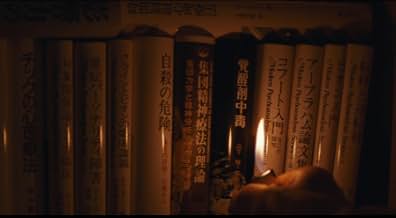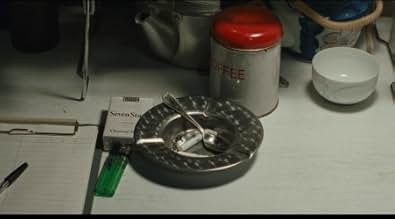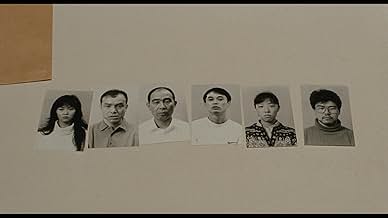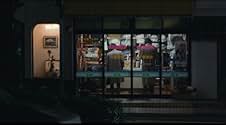Un détective frustré enquête sur plusieurs meurtres effroyables commis par des personnes qui n'ont aucun souvenir de ce qu'elles ont fait.Un détective frustré enquête sur plusieurs meurtres effroyables commis par des personnes qui n'ont aucun souvenir de ce qu'elles ont fait.Un détective frustré enquête sur plusieurs meurtres effroyables commis par des personnes qui n'ont aucun souvenir de ce qu'elles ont fait.
- Réalisation
- Scénario
- Casting principal
- Récompenses
- 9 victoires et 2 nominations au total
Avis à la une
This enigmatic, slow-burning horror focuses on a series of grisly, almost identical murders committed by people who can't remember why or how they did them. The mystery of 'Cure (1997)' shifts from uncovering the link between the killings to deciphering the true nature of a strange amnesiac who pops up near each crime scene. The movie never gives you an overt answer, remaining decidedly ambiguous even as it enters its final moments, but it's consistently compelling nevertheless. It pulls you into its beguiling world and doesn't let you go. It isn't overtly scary; its horrors creep up on you, sending shivers down your spine before you even know they're there. Its themes are fairly frightening and its cold, somewhat uncaring atmosphere doesn't afford much in the way of comfort. There are some sequences that are almost hypnotic, too. Though almost every aspect of the piece is relatively subdued, it has a rather strong overall effect. It's the sort of thing that has the potential to keep you up at night. 7/10
It's not easy to give yourself over to this film, for like the unwilling victims' it portrays, it rather slowly and methodically casts its spell, whisking you farther and farther away from the comfortable rhythm and conventions of the crime thriller it appears to be on the surface.
Kyua's austere landscapes are in fitful turns picture postcard beautiful, mundane and mysterious. Much of the story unfolds in master shots, keeping you at a distance from the characters and affording the illusion of a comfortable intellectual detachment which it meticulously strips away scene by scene.
The plot is deceptively simple; a weary Japanese Homicide detective is investigating a series of grotesque murders. Each murder seems to have the same ritualistic pattern, yet in each case the culprit turns out to be an ordinary individual, dazed and unable to offer any motive for their horrific crime. Nothing seems to connect the murderers to each other, until the Detective picks up the trail of an amnesia afflicted drifter who seems unable to answer even the simplest questions about himself, yet displays a disconcerting ability to reflect any line of questioning about his own identity back upon the questioner. Time and again he returns to a question at the core of the mystery:
"Who are you?"
It seems more and more, as the drifter is passed from detective, to guard, to clinician to pyschiatrist, that this question is far more dangerous than anyone might have guessed.
Kyua is a model of subtlety and restraint. Although there's a significant amount of implied violence and several shocking scenes of murder, these aren't gratuitous. Kyua's particular genius is it's ability to transform it's urban Japanese landscapes and even the most common objects from familiar to suspect and eventually sinister: a length of piping, a flashing traffic sign, a blast furnace, the sound of ocean surf at night, a flickering lighter, a dark apartment lined with academic tomes, a puddle of spilled water, the letter X smeared on a wall, a deserted rundown building.
There are few filmmakers with the audacity and imagination to venture into the places Kyua wants to take you. Fincher, Lynch and Cronenberg come to mind as those who time and time again have shown their willingness, and perhaps compulsion to return to the unsettling territory of perception, identity, and the boundary between normalcy and psychosis. If the director's first name were only David (it's not, his name is Kiyoshi Kurosawa) we'd have the makings of a good conspiracy theory here.
The film was released in 1997 but only recently has made it's way to western shores, and US distribution by Cowboy Pictures, and has wound its way inevitably to cable networks like Sundance. It's cast includes Koji Yakusho as the detective Takabe. Fans of Japanese cinema will recognize this fine actor from his award winning roles in "Shall we Dance" and "The eel".
Kyua isn't the type of visceral immediate drama that the average suspense film provides. If you can put aside your preconceived notions and allow it to unfold in it's own time, I suspect you will find the questions it asks and secrets it reveals to be all the more disquieting, problematic and in the end profound. Many critics have lined up to call this film a masterpiece, and pegged Kurosawa as one of a number of japanese directors worth watching.
Kyua's austere landscapes are in fitful turns picture postcard beautiful, mundane and mysterious. Much of the story unfolds in master shots, keeping you at a distance from the characters and affording the illusion of a comfortable intellectual detachment which it meticulously strips away scene by scene.
The plot is deceptively simple; a weary Japanese Homicide detective is investigating a series of grotesque murders. Each murder seems to have the same ritualistic pattern, yet in each case the culprit turns out to be an ordinary individual, dazed and unable to offer any motive for their horrific crime. Nothing seems to connect the murderers to each other, until the Detective picks up the trail of an amnesia afflicted drifter who seems unable to answer even the simplest questions about himself, yet displays a disconcerting ability to reflect any line of questioning about his own identity back upon the questioner. Time and again he returns to a question at the core of the mystery:
"Who are you?"
It seems more and more, as the drifter is passed from detective, to guard, to clinician to pyschiatrist, that this question is far more dangerous than anyone might have guessed.
Kyua is a model of subtlety and restraint. Although there's a significant amount of implied violence and several shocking scenes of murder, these aren't gratuitous. Kyua's particular genius is it's ability to transform it's urban Japanese landscapes and even the most common objects from familiar to suspect and eventually sinister: a length of piping, a flashing traffic sign, a blast furnace, the sound of ocean surf at night, a flickering lighter, a dark apartment lined with academic tomes, a puddle of spilled water, the letter X smeared on a wall, a deserted rundown building.
There are few filmmakers with the audacity and imagination to venture into the places Kyua wants to take you. Fincher, Lynch and Cronenberg come to mind as those who time and time again have shown their willingness, and perhaps compulsion to return to the unsettling territory of perception, identity, and the boundary between normalcy and psychosis. If the director's first name were only David (it's not, his name is Kiyoshi Kurosawa) we'd have the makings of a good conspiracy theory here.
The film was released in 1997 but only recently has made it's way to western shores, and US distribution by Cowboy Pictures, and has wound its way inevitably to cable networks like Sundance. It's cast includes Koji Yakusho as the detective Takabe. Fans of Japanese cinema will recognize this fine actor from his award winning roles in "Shall we Dance" and "The eel".
Kyua isn't the type of visceral immediate drama that the average suspense film provides. If you can put aside your preconceived notions and allow it to unfold in it's own time, I suspect you will find the questions it asks and secrets it reveals to be all the more disquieting, problematic and in the end profound. Many critics have lined up to call this film a masterpiece, and pegged Kurosawa as one of a number of japanese directors worth watching.
I saw CURE at the San Francisco Film Festival in around 1998, and like many, I found the concept and craftsmanship arresting. A number of audience members stayed around afterwards to discuss it - it's a psychologically complex tale of hypnotism and the seductions of altered consciousness. Koji Yakusho (DORA HEITA, 13 ASSSASSINS, etc.) is at his acting peak as a detective who tries to solve a series of murders that don't seem to relate to common logic.
Recently, I saw the DVD version of the film - and it's clear that the film had been cut severely. Most viewers have only seen the US DVD version, so they're not even aware of the problem. A few of the more graphic sequences were cut, important portions of the narrative set in an old sanatorium were excised, and the violent finish was excised entirely. (The US DVD concludes with the suggestion of a further killing; the theatrical Japanese version is more powerful and unambiguous.) In some cases, a later, recut version may be better than the original; however, that's not the case here.
There's scant online text relating to the differences between the two versions.
It speaks well for director Kiyoshi Kurosawa that he took a low-budget police procedural and made an innovative thriller out of it. Most of the scenes are under-edited and shot at a distance, to extract the most from the hypnotic storyline; the longer, hypnotic sequences are several minutes long, with no edits. Because the film uses medium-distance shots to give a sense of hypnotic disassociation, viewers with larger screens will gain an advantage.
I strongly recommend seeing it - but would suggest you seek out the original, uncut theatrical print if you can. The differences are striking. I'd rate the original print as 10/10; the cut/domestic DVD is maybe 7/10. This film would profit from a Criterion reissue, but that doesn't seem to be in the works.
Recently, I saw the DVD version of the film - and it's clear that the film had been cut severely. Most viewers have only seen the US DVD version, so they're not even aware of the problem. A few of the more graphic sequences were cut, important portions of the narrative set in an old sanatorium were excised, and the violent finish was excised entirely. (The US DVD concludes with the suggestion of a further killing; the theatrical Japanese version is more powerful and unambiguous.) In some cases, a later, recut version may be better than the original; however, that's not the case here.
There's scant online text relating to the differences between the two versions.
It speaks well for director Kiyoshi Kurosawa that he took a low-budget police procedural and made an innovative thriller out of it. Most of the scenes are under-edited and shot at a distance, to extract the most from the hypnotic storyline; the longer, hypnotic sequences are several minutes long, with no edits. Because the film uses medium-distance shots to give a sense of hypnotic disassociation, viewers with larger screens will gain an advantage.
I strongly recommend seeing it - but would suggest you seek out the original, uncut theatrical print if you can. The differences are striking. I'd rate the original print as 10/10; the cut/domestic DVD is maybe 7/10. This film would profit from a Criterion reissue, but that doesn't seem to be in the works.
I think it is important to distinguish Cure from the avalanche of white-face-ghost-girl Japanese horror flicks that followed in Ringu's wake. Purely because it's a different beast and lumping it in a convenient J-horror niche is doing it a disservice. I won't go into plot specifics because it's only a skeleton for Kurosawa to hang his atmospherics. That said, I can understand the complaint many viewers seem to share ("man, it doesn't make sense") but without having any claims on solving Cure's riddle, I'm satisfied with letting wash over me, one watch at a time.
Kurosawa wisely doesn't attempt to explain his plot. He's content to lift the veil just enough for us to sneak a glimpse in before he disorients again. The plot slowly builds through little tokens that are never followed by an orchestral crescento to signal their arrival. They just happen. A small photo in a book, muffled words on a phonogram, an old video, the ramblings of an amnesiac, theories on 18th century Austrian doctors. In the course of the film, everything seems to be coming together only to remain elusive in the end. In that aspect I find Cure to be closer to Last Year at Marienbad than your average Ringu clone. It's not about making sense, it's about pushing limits within which you can. It's about soaking in the impression it makes. When muffled words come through a phonogram, they're more incoherent ramblings than a telegraphed plot solution; but they contribute just as well to the overarching feel. This elliptic mentality is abetted by Kurosawa's choice of a slow, deliberate pace and many long shots, entire scenes covered without any cuts. The gritty and rundown aspect of Tokyo is photographed like a more naturalistic version of David Fincher's work and does the job well.
It's my impression that a surrealist air hovers above and at the heart of Cure, at times reminiscent of a more languid version of Lynch. It is undoubtedly a horror movie so don't be put off by my Resnais comparison, but it's as much bleak as it is subtle and leaves enough to the mind's eye to make you carry it out with you.
Kurosawa wisely doesn't attempt to explain his plot. He's content to lift the veil just enough for us to sneak a glimpse in before he disorients again. The plot slowly builds through little tokens that are never followed by an orchestral crescento to signal their arrival. They just happen. A small photo in a book, muffled words on a phonogram, an old video, the ramblings of an amnesiac, theories on 18th century Austrian doctors. In the course of the film, everything seems to be coming together only to remain elusive in the end. In that aspect I find Cure to be closer to Last Year at Marienbad than your average Ringu clone. It's not about making sense, it's about pushing limits within which you can. It's about soaking in the impression it makes. When muffled words come through a phonogram, they're more incoherent ramblings than a telegraphed plot solution; but they contribute just as well to the overarching feel. This elliptic mentality is abetted by Kurosawa's choice of a slow, deliberate pace and many long shots, entire scenes covered without any cuts. The gritty and rundown aspect of Tokyo is photographed like a more naturalistic version of David Fincher's work and does the job well.
It's my impression that a surrealist air hovers above and at the heart of Cure, at times reminiscent of a more languid version of Lynch. It is undoubtedly a horror movie so don't be put off by my Resnais comparison, but it's as much bleak as it is subtle and leaves enough to the mind's eye to make you carry it out with you.
The serial killer movie has by now been done to death (so to speak), so it's especially rewarding to see this assured film that takes a truly ingenious approach. Kurosawa's protagonist is a seemingly dazed young man who, in spite of his aimless demeanor, is a master hypnotist. To reveal any more of what happens would be to give a bit too much away.
The subtlety and fluidity of this film is remarkable. The main character can be charming and simultaneously irritating when he speaks. He turns his speaking partner's question back on the speaker; he answers with vague phrases that nevertheless, over the course of the film, gradually bring out the complexity of his psyche. Pitting him against a cop whose wife seems to suffer from something like the hypnotist's 'brand' of mental wanderings underlines the thematic context of the film: what we know is almost certainly only what we think we know. And what we think we know is almost certainly based on someone else's 'knowledge', derived the same as ours.
That knowledge is a collective phenomenon, a shared and critical feature of the 'hive' is not a novel concept in film. But its presentation here is bold and original. To link that idea with a person who destroys life is a master stroke; it says that what we know vanishes in a suddenly extinguished flame, or a tiny stream of water that appears, runs, and then is seen no more.
This is a film that should definitely be added to the great films of the 90s. Since it was not released in the U.S. until 2001, I vote for it being one of the great films of that year here.
The subtlety and fluidity of this film is remarkable. The main character can be charming and simultaneously irritating when he speaks. He turns his speaking partner's question back on the speaker; he answers with vague phrases that nevertheless, over the course of the film, gradually bring out the complexity of his psyche. Pitting him against a cop whose wife seems to suffer from something like the hypnotist's 'brand' of mental wanderings underlines the thematic context of the film: what we know is almost certainly only what we think we know. And what we think we know is almost certainly based on someone else's 'knowledge', derived the same as ours.
That knowledge is a collective phenomenon, a shared and critical feature of the 'hive' is not a novel concept in film. But its presentation here is bold and original. To link that idea with a person who destroys life is a master stroke; it says that what we know vanishes in a suddenly extinguished flame, or a tiny stream of water that appears, runs, and then is seen no more.
This is a film that should definitely be added to the great films of the 90s. Since it was not released in the U.S. until 2001, I vote for it being one of the great films of that year here.
Le saviez-vous
- Gaffes(at around 51 mins) In Japan, they drive on the left side of the road and the steering wheel is on the right side of the car. In every scene in this picture that's the case - except one. When the detective leaves in his car to go to the hospital because Mamiya has turned up there, the steering wheel is on the left and he drives on the right side of the road.
- Citations
Kunio Mamiya: All the things that used to be inside of me... now they are all outside.
- Crédits fousThere are no opening credits, with the exception of the movie's title.
- ConnexionsEdited into Cure: or How to Be Happy While Saving the Species (2017)
Meilleurs choix
Connectez-vous pour évaluer et suivre la liste de favoris afin de recevoir des recommandations personnalisées
- How long is Cure?Alimenté par Alexa
Détails
Box-office
- Budget
- 1 000 000 JPY (estimé)
- Montant brut mondial
- 232 829 $US
- Durée
- 1h 51min(111 min)
- Couleur
- Mixage
- Rapport de forme
- 1.85 : 1
Contribuer à cette page
Suggérer une modification ou ajouter du contenu manquant

![A mesmerising and hypnotic psychological thriller from Kiyoshi Kurosawa...
Released to critical acclaim in both the East and the West, CURE was a breakthrough film for director Kiyoshi Kurosawa, a nerve shredding thriller about the hunt for a serial killer in a bleak and decaying Tokyo.
A series of murders have been committed by ordinary people who claim to have had no control over their horrifying actions. Following the only link - a mysterious stranger who had brief contact with each perpetrator and their victim - detective Kenichi Takabe (Kôji Yakusho, 13 ASSASSINS, TOKYO SONATA) places his own sanity on the line as he tries to end the wave of inexplicable terror.
Described as one of the greatest films of all time by Bong Joon-ho (THE HOST, SNOWPIERCER), CURE is a deeply unsettling masterpiece of its genre, and has shockingly been unavailable on home video in the UK until now. The Masters of Cinema Series is proud to present Cure in a special Dual Format edition.
CURE [Kyua], Kiyoshi Kurosawa's mesmerising and hypnotic psychological thriller, is released on home video for the first time in the UK as part of The Masters of Cinemas Series in a Dual Format edition on 23 April 2018.](https://m.media-amazon.com/images/M/MV5BZjdlYmU3YTktZTQzNi00YWE5LTgzZjQtYmI3OTRkNTQyYTkxXkEyXkFqcGdeQXVyMTg2NTc4MzA@._V1_QL75_UX500_CR0)


















